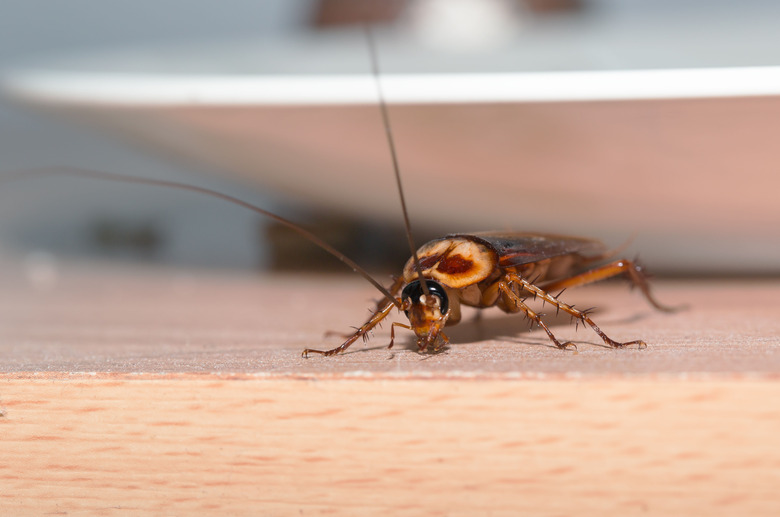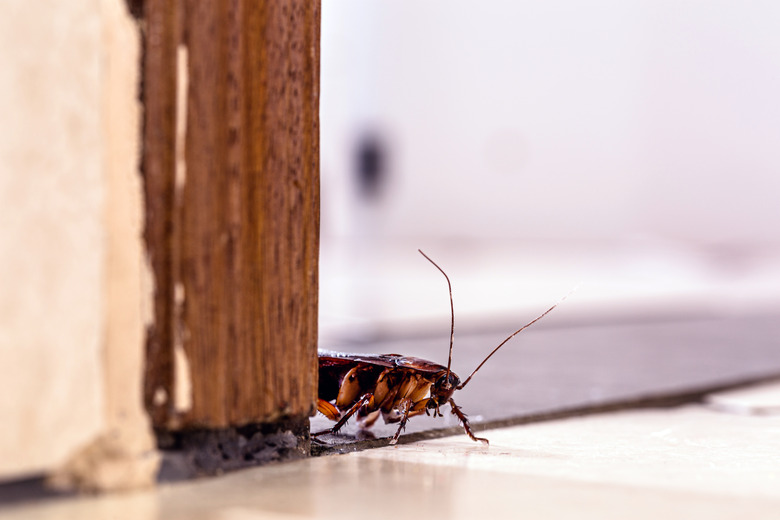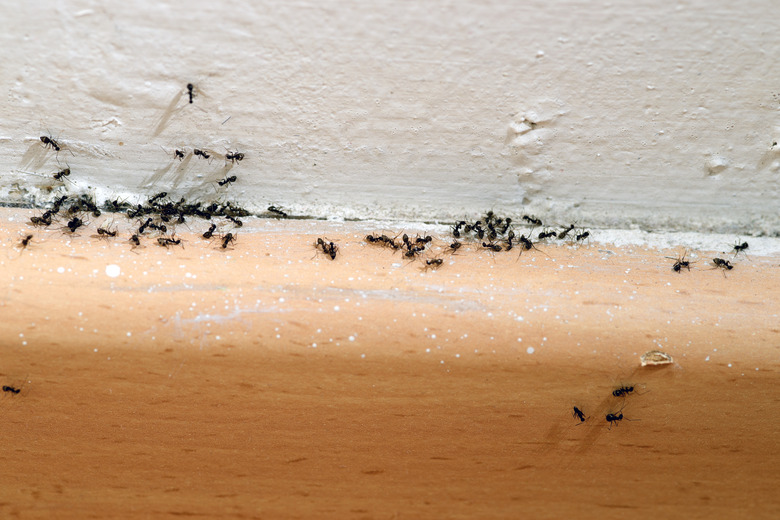Professional Vs. DIY Pest Control: Which Is Right For You?
We may receive a commission on purchases made from links.
When your home is infested by rats, mice, cockroaches, termites or any other pest, you need to address the problem quickly — not only because no one wants creepy crawlies running around, but also to minimize the dangers to your family and your home. Because exterminators are expensive, you may consider attempting DIY pest control to save money. Depending on your situation, though, you may be a lot better off hiring a professional for your rodent or insect control needs.
Tip
Whether or not you should resort to DIY pest control depends on the type of pest, the severity of the infestation, the cost of DIY vs. professional treatment, your comfort level, the type of pest control necessary and the effectiveness of the treatments.
Identifying the Type of Pest
Identifying the Type of Pest
One of the biggest factors in determining whether you should do the work yourself is recognizing what kind of pest is in your home. As an example, since most ants don't carry disease or present a serious threat to your home, you can usually turn to do-it-yourself pest control methods because if your first attempt fails to clear the problem, you can always try again without any real consequences. On the other hand, when it comes to carpenter ants, it's often a good idea to resort to professional pest control services since these pests actually damage the wood in your home just like termites, so if you fail to fully put an end to the infestation, your home may suffer significant damage as a result.
Once you identify the type of pest, you may need to do some research on the best pest control treatment for your situation in order to consider how expensive, effective, dangerous and time consuming it will be to handle the problem yourself.
The Severity of the Infestation
The Severity of the Infestation
Obviously, if you have one single rat or a small trail of ants leading from the window or door to an open container in your pantry, DIY pest control is probably the best way to go due to the small size of the infestation. Similarly, if the pest problem is limited to your garage, DIY methods should be enough to reach the entire space where the pests live.
The best thing to do before deciding on DIY vs. professional pest control is to identify and analyze the type of pest and the severity of the infestation. For example, you may have a simple time eliminating a few rats in one room, but if they've been in the home for a long period and have made nests in the walls, you may want to call an exterminator. On the other hand, bed bugs are a particularly problematic pest, and even if you think they're only in one room, you may be best off hiring a professional pest control service because they can easily spread to the rest of the home, and they are very difficult to fully eliminate.
It's worth adding that it can sometimes be difficult to diagnose the full severity of a pest infestation since these creatures often hide undetected in walls, crawl spaces and other hidden areas. In some cases, you might want to ask a professional for an inspection and estimate just to ensure you have identified the full scope of the problem.
Different Pest Control Methods
Different Pest Control Methods
You'll need to identify what pest control methods are necessary. The main types of pest control methods include:
- Chemical: This method involves using some type
of chemical agent, such as fumigation, poisons and sprayable pesticides. - Physical: You can create a barrier to stop pests from
entering (or leaving) a particular area. When it comes to home pest control,
this means taking measures to stop rats, bugs and other pests from entering the
home as well as using chemical-free traps (such as humane traps,
glue traps
or snap traps) to stop creatures from leaving an area. - Electrical: This new type of pest control involves killing or repelling pests with electrical means, such as
bug zappers or devices that repel rodents with ultrasonic sound. - Biological: The ultimate form of natural pest
control, this method involves using a living organism, such as a predator, parasite or disease organism to put an end to the pests. For example, a pet cat can eat mice. Unfortunately, this method is the least effective when
it comes to severe indoor infestations. - Hygiene: Keeping a home clean is the best way to
prevent many pests from entering a home in the first place by reducing the
food, filth or other things that attract bugs and rodents. This doesn't help
once you already have an infestation, though.
Understanding what type of efforts are needed to eliminate your problem is important because it can help you identify both the scope of the project and what's actually involved. In many cases, both chemical and physical measures are necessary to eliminate an infestation. As an example, you may need to kill the rats already in your home and use caulk, chicken wire or other materials to seal off your home so they cannot gain entry in the future.
Sometimes, understanding what is required can help you save some money by electing to do some work as a DIY project and hiring a professional to do the rest. For example, if you don't feel comfortable working with toxic chemicals, you may hire an exterminator to apply pesticides, but you might install physical barriers to stop creatures from entering your home.
Hazards of DIY Pest Control
Hazards of DIY Pest Control
When determining whether to do your own pest control, it's important to think about the potential dangers. Many chemicals used as pesticides are toxic to humans — particularly children — and pets. This is why some of these products are only available to professionals who have been properly trained in their use, storage and disposal. Even safer products sold at your local hardware store may be dangerous when used improperly or without proper safety gear.
It's also important to consider the potential dangers the pests themselves may present. Creatures such as rats and venomous spiders can bite you, but there are many other ways pests can cause you injury or illness. As an example, contact with rat urine and feces can result in the spread of leptospirosis, which can cause damage to the kidneys and liver. Also keep in mind that when dealing with rodents, you may need to remove the dead carcasses and be in areas filled with their urine, which is not only gross but can also put you at risk of exposure to dangerous pathogens.
You may also need to enter tightly enclosed areas, such as an attic or crawl space, or climb onto the roof to install barriers to keep pests out. If you're not 100 percent comfortable with the risks associated with DIY pest control, it may be worth the peace of mind to hire a professional.
DIY Cost Savings
DIY Cost Savings
One of the biggest reasons people take on the challenges of DIY pest control is because professional pest control companies are expensive. As an example, hiring a professional exterminator to treat a large rat infestation can cost $500 to $800. While most insect treatments are less than $250, termite fumigation is anywhere from $2,000 to $8,000.
It's important to recognize that it can still cost a lot of money to buy the necessary supplies to do pest control yourself. When treating insect infestations, you'll generally need a sprayer, chemicals, gloves, goggles, a respirator and possibly a full protective suit. The good news is that once you've made this investment, you can reuse these over and over again.
When taking into consideration the savings of DIY pest control, be sure to consider the amount of labor involved in the effort. If it takes you eight hours to put up barriers and rat traps and to clean up the corpses, it may be worth the cost of an exterminator just to avoid these tedious, dangerous and gross tasks.
Pest Control Effectiveness
Pest Control Effectiveness
Professionals have the technical know-how to ensure their treatments are as effective as possible, both in what products are used and how they are used. Without this expertise, your treatments may not be as effective, and the infestation may continue. In fact, many people end up learning that they still need to hire a professional after going the DIY route initially. This is not only a waste of time and money but it can also allow pests to do additional damage to your home.
It's worth mentioning that many pest control companies offer a warranty on their work, so if their methods don't work initially, they will return again and again until the pests are fully gone. When you do the work yourself, if things fail, your options are simply to try again or hire a pro.
Obtaining Professional Pesticides
Obtaining Professional Pesticides
If you plan to exterminate pests using chemicals, many of these products that were previously only available to professionals can now be purchased by anyone online. That being said, many states prohibit the sale of these products to consumers, and some states prohibit the use of certain chemicals altogether. By working with a professional, you're ensuring that you won't end up running afoul of the law, but if you're interested in going the DIY route, be sure to do some research about local environmental and safety laws that may limit what chemicals you can use. You should also take time to research the product itself to ensure you feel comfortable working with it before purchasing.
References
- All Wildlife Removal: What Exactly Do Exterminators Do About Mice?
- Orkin: Diseases That Are Spread or Carried by Rats
- RentPost: The Pros and Cons of DIY Pest Control
- The Pest Advice: Can Ants Damage Your Home?
- Go-Forth Pest Control: Different Types Of Pest Control Methods
- U.S. Environmental Protection Agency: Do-it-yourself Bed Bug Control
- Oasis Turf & Tree: Hiring a Pro vs. DIY Pest Control: Your Best Move for Keeping Bugs Out of Your House
- Fixr: How Much Does a Rat Exterminator Cost?
- HomeAdvisor: How Much Does An Exterminator Cost?


